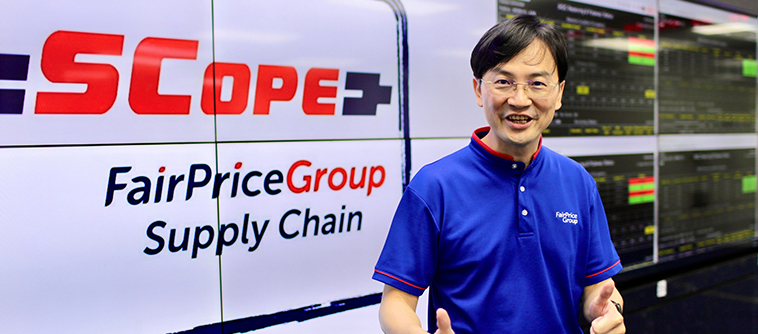
The last two years have not been easy for supply chain managers. Pandemic-induced production stoppages and shipping bottlenecks caused widespread disruption, prompting firms to scramble for supplies. The current war in Ukraine has further dashed hopes that the turmoil might be easing.
Hoon Ping Ngien was thrown into the thick of it when he was appointed CEO of a new Supply Chain unit at Singapore-based retailer FairPrice Group in September 2020, and tasked with ensuring the continuity of the food supply of the island city-state.
Ngien and his team rose to the challenge and set about building a digital nerve center for the group’s operations, relying on real-time data and analytics to track every shipment and the inventory of the retailer’s 150 key outlets.
“Pre-COVID and in the early stages of the pandemic, we didn’t have this operations centre. Early warning and decision-making at the system level of an end-to-end supply chain was not possible. People were just working in silos. Now, we can literally see all our shipments, from source to store, and see which stores are running out of stock. This has helped to prevent food shortages and panic buying in the last two years,” said Ngien.
When the Ever Given mega ship got jammed in the Suez Canal in March 2021, blocking one of the world’s major trade arteries, Ngien’s team was alerted hours before the story was reported by mainstream news outlets, thanks to a sophisticated end-to-end monitoring software which was deployed at the Supply Chain digital operations centre. This gave FairPrice Group a head start in organizing alternative supplies for the foodstuffs stranded in transit due to the blockage.
Founded in 1973 to help moderate the cost of living, FairPrice Group has grown to become a leading retailer serving half a million customers per day. The group is also charged with securing the food supply of the island city-state, which imports over 90% of the food it consumes.

Hoon Ping Ngien and staff in a warehouse in Singapore
Leading by example
Ngien appears unscathed by the turbulence of the pandemic. He cites his biggest challenge as maintaining the morale of his staff when there was no clear end in sight.
Even while coronavirus was spreading rapidly, Ngien went to the office daily to show solidarity with FairPrice Group’s employees who were carrying out essential work in its warehouses and distribution centers.
“I made a point to come to the office as often as I could simply to let the warehouse workers know that management was taking the same risks.”
His tip for steadying the ship in moments of crisis is to remain calm and to provide consistent leadership. “Sometimes leaders overreact and think they are solving problems. But in the process, you aggrieve your own staff.”
Instead, Ngien uses moments of relative stability to build trust with employees by explaining the reasoning behind his decision-making.
“Crises don’t strike every day. Typically, in any organization, there is a stage of normality. So, my approach has always been to win the trust of staff. How you do this is through transparency, encouraging open sharing and coaching.”
This modus operandi has served Ngien well over a career spent in various leadership positions in government organizations. Before joining FairPrice Group, he was CEO at Singapore’s Land Transport Authority where he, his LTA team and Public Transport Operators achieved record performance for the Singapore MRT system. In August he will return to the transport sector to take up the position of Group CEO at Singapore public transport company operator SMRT.
An electrical engineer by training, Ngien is excited to oversee the completion of the 4km Rapid Transit System link between Malaysia and Singapore, as well as explore digital growth opportunities and advance SMRT’s sustainability efforts.
Singapore’s rail and bus networks are heavily used, with more than 60% of residents taking public transport to work in 2020, meaning they are quick to complain at the slightest disruption. But Ngien is not feeling the pressure.
“My strategy has always been to focus on my people,” he said. “If you have done your best and you focus on the morale of people, at some point, the results will show.”
Clarity and consistency
Before taking the helm at LTA, Ngien completed the Breakthrough Program for Senior Executives (BPSE) program at IMD. He spent 10 days immersed in courses focusing on how to reveal breakthrough insights needed to tackle critical issues his organization faced.
Six years later, Ngien still applies the lessons he learned at BPSE directly.
“One lesson was to give people time,” he said. “Just because you as a leader understand why you need to change, it doesn’t mean that the rest of your people are with you. And as a CEO, you have to win over your people and sometimes, it means to repeat the same message many times.”
To be a good leader, Ngien also believes you have to empathize with your people and be interested in what drives them. Another underrated quality, he said, is knowing the right time to hand the reins to someone else.
“Leadership is not about entitlement but stewardship and whether you can really add value as a leader,” he said. “It’s about boarding a ship that is already going in one direction. You need to think about whether you are the best fit to steer it well to its destination.”
Ngien applied this strategy when he was offered the CEO role at SMRT. With expertise in digitalization and operational processes – tried and tested during one of the most disruptive chapters in recent history – Ngien is excited to navigate the disruption in the transport sector and grow SMRT sustainably.


